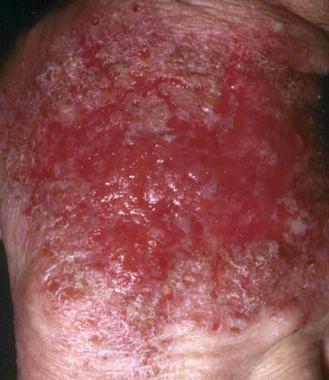- Keep the patient’s nails cut short. Cutting the nail will reduce skin damage due to scratching.
- Apply lotions and creams skin immediately after bathing.Hydration is effective in preventing disruption of the stratum corneum layer of the skin barrier.
- Protect the patient’s skin from the the possibility of maceration (excessive hydration of the stratum corneum) when installing wet bandage since maceration on healthy skin can cause rupture of the skin and the expansion of the primary abnormality.
- Avoid the risk of thermal injury due to the use of warm compresses and too high temperatures.Patients with dermatitis may experience a decrease in sensitivity to heat.
- Soak patient in a comfortably cool bath. Sprinkle the water with baking soda or an oatmeal-based bath product (Aveeno, others).
- Advise patient to wear smooth-textured cotton clothing. This helps avoid irritation.
- Advise patient to wear gloves to protect hands from cold weather, wet work and contact with substances irritant to the skin, such as shampoos, detergents, polishes, solvents, cleaning agents, stain removers and when preparing food such as citrus fruit, potatoes and tomatoes.
- Assess the causes of disturbance in the sense of comfort.
- Control irritant factors since itching can be aggravated by heat, chemical and physical.
- Maintain humidity of approximately 60% since with low humidity, skin will lose water.
- Maintain a cold or cool environment to reduce itching.
- Use a mild soap or special soap for sensitive skin.These include the absence of a solution of detergent, dye or reinforcement material.
- Wash bed linens and clothes with a mild soap since harsh soaps can cause irritation to the skin.
- Compress Air with cold water in order to relieve the itching.
- Use of topical therapy as prescribed by a doctor (steroid creams)
- Apply medications to repair the skin (as prescribed). You can help repair the skin and prevent relapse with creams and ointments containing drugs that affect the immune system, such as calcineurin inhibitors tacrolimus (Protopic) or pimecrolimus (Elidel). This solution is recommended for long-term treatment of contact dermatitis. But the Food and Drug Administration has warned about a possible link between these drugs and lymphoma and skin cancer.
- Administer oral medications (as ordered in severe cases) such as oral corticosteroids to reduce inflammation, antihistamines to relieve itching or antibiotics to fight a bacterial infection.
Sources:
- https://nursingdiagnosis-nursinginterventions.blogspot.com/2015/04/nursing-diagnosisand-interventions-for.html
- https://www.mayoclinic.org/diseases-conditions/contact-dermatitis/basics/treatment/con-20032048
- https://www.nursinginpractice.com/article/irritant-and-allergic-contact-dermatitis-0







